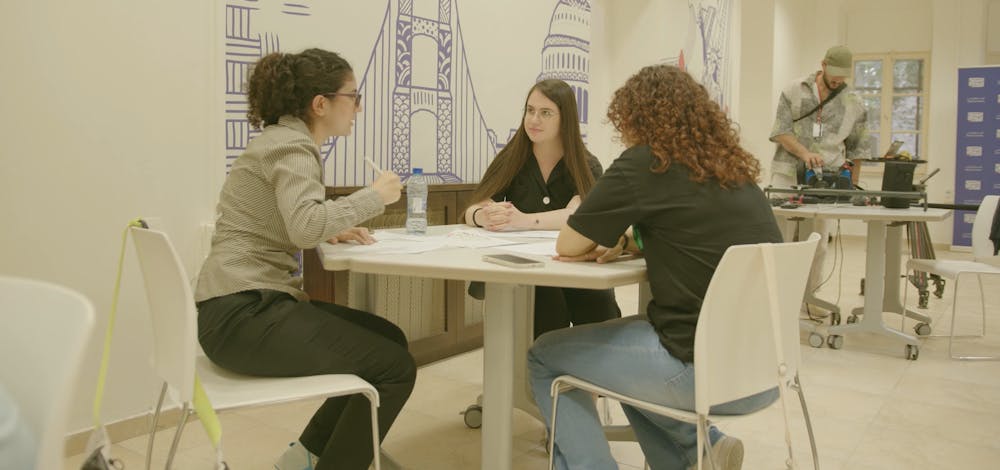“Creating Change,” a documentary directed by Dina Amin and produced by Western Washington University professors Brian J. Bowe and Bidisha Biswas, highlights the experiences of two young Palestinian women who participated in media literacy workshops in Jerusalem and Ramallah during the summer of 2023.
The eight-minute documentary recently won the Best Human Rights Short Film award at the Love Peace and Freedom Film Festival in Chiapas, Mexico.
Donia Dibi is a student at Bethlehem University. The film highlights her experience in the media literacy workshops and the inspiration behind the content she created.
Dibi uses humor to tell stories about her life under Israeli occupation.
“To say I’m a comedian is enough for me because it’s what I feel makes me unique,” Dibi said in the film.
According to Dibi, the workshops helped add a touch of the Palestinian character to the content she makes.
“This workshop introduced me to how we as Palestinians can really take advantage of social media,” Dibi said. “We can really utilize it, use it positively.”
Rand Fararjeh is a graduate of Bethlehem University. In “Creating Change,” she expresses her desire to represent the Palestinian community accurately and correct unfair stereotypes about Palestinians that are promoted in the West.
“You’re not only representing an individual story, but you’re also representing a whole community’s story,” Fararjeh said in the film.
Fararjeh’s medium of storytelling is writing.
“Anything that gives me specific inspiration during my day, I like to write about it,” Fararjeh said.
In the past few years, as attacks in the Gaza Strip have accelerated, so has citizen journalism about the conflict. Social media has now become the vessel by which the realities of war are uncovered, alongside, or sometimes in spite of, traditional media coverage.
“By livestreaming and documenting their own stories and sharing them for the world to see, [Palestinians] have the opportunity to tell their own story on their own terms,” Sara Shaban, an assistant professor of communication at Seattle Pacific University, wrote in an email.
Shaban is a scholar at the intersections between media, women’s social movements and Middle Eastern geopolitics. Her inaugural book is titled “Iranian Feminism and Transnational Ethics in Media Discourse.”
“You have to fight the urge to dehumanize or reduce Palestinians to simply victims in a news story,” Shaban said. “Sometimes, people don’t quite understand the things happening in this world, because they can’t relate to those experiences."
Shaban presents three essential questions for media literacy: Who is telling the story, who is profiting off that narrative and what are the consequences of that narrative?
The workshops featured in “Creating Change” aimed to equip young Palestinian people with the tools to share their experiences with content creation.
“Through this workshop, I was hopeful about obtaining more skills to know how to represent the Palestinian people,” Fararjeh said. “ Not only represent them, but do it in the best way possible.”
Shaban thinks journalists also have a role to play when it comes to portraying Palestinian life with sensitivity.
“Journalists should create a space for the people in these news stories to tell their own stories,” Shaban said. “Palestinians have voices, but they need space to be heard.”

Donia Dibi and Rand Fararjeh, featured in Dina Amin’s “Creating Change,” work to challenge stereotypes about Palestinian life in media literacy workshops in Jerusalem and Ramallah during the summer of 2023. // Photo courtesy of Bidisha Biswas
Josh Hernandez (he/they) is a campus news reporter for The Front this quarter. He is a third-year journalism news/ed major. Outside of journalism, his other interests include literature, geography, and music history. You can reach him at joshhernandez.thefront@gmail.com.






